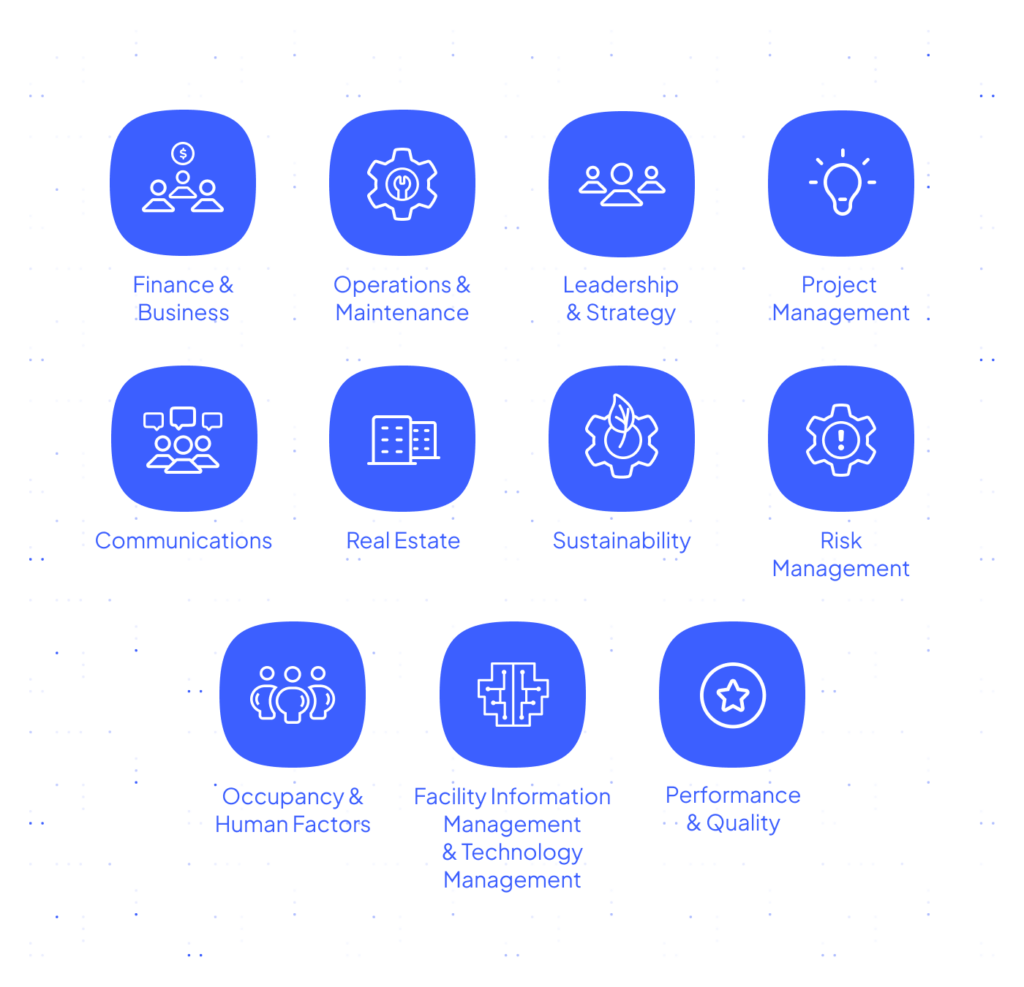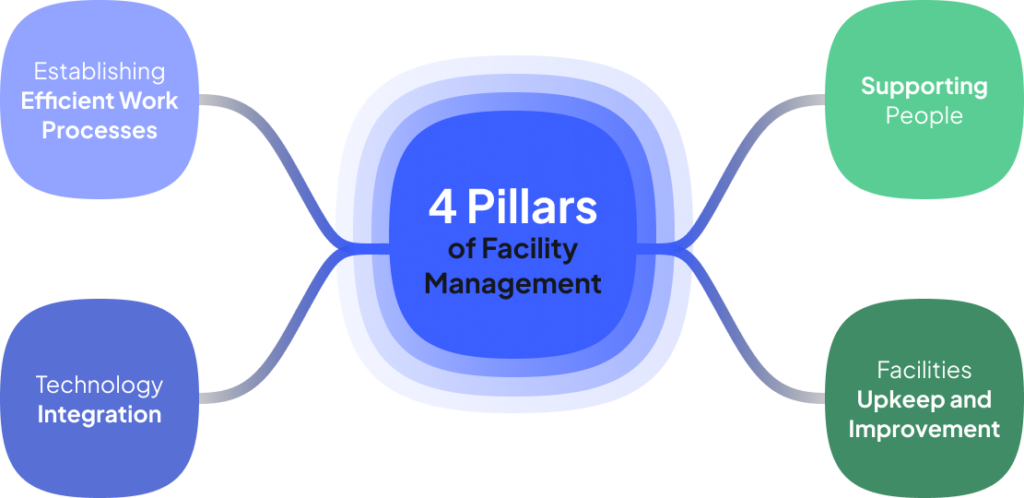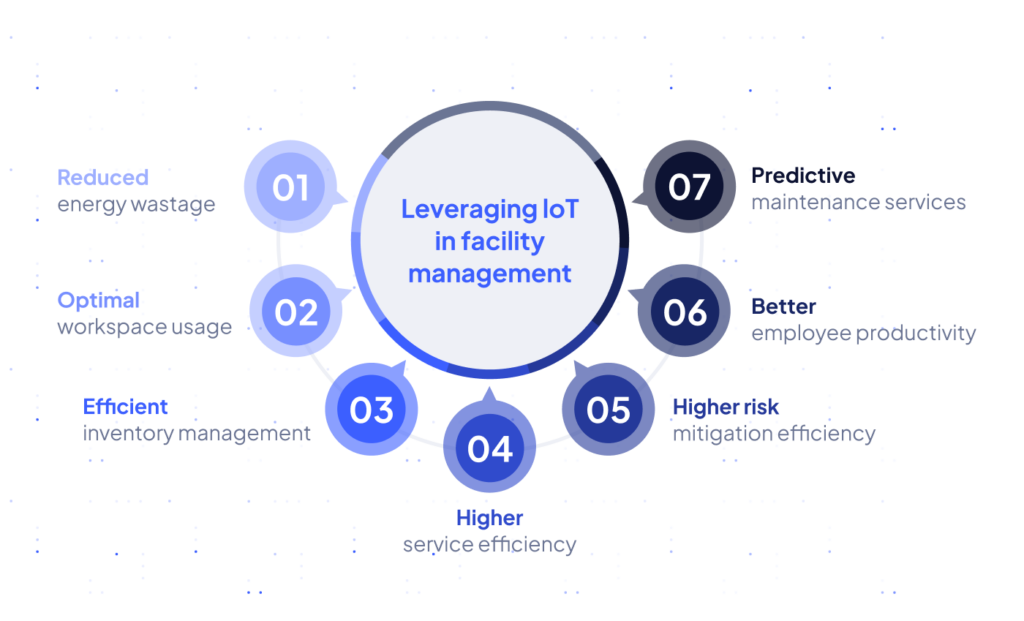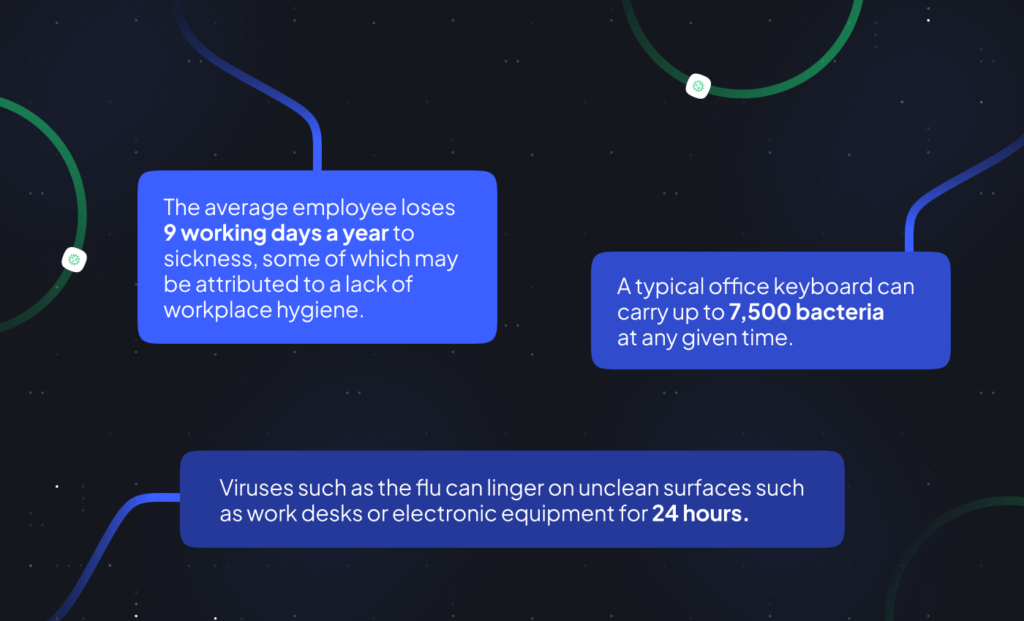If you’ve landed on our blog here at Infraspeak, you’ve invariably heard of facility management. But in such a broad field, it’s not always easy to understand exactly what a facility manager does. Today, once and for all, we will answer the big question: What is facility management?
What does facilities management consist of?
Facilities management (FM) covers maintenance, security, energy management, and space optimisation. It ensures buildings and infrastructure operate efficiently, safely, and cost-effectively.
✔ For deeper insight, see FM descriptions by 20 professionals in the field.
Facilities management is divided into two main categories:
- Hard facilities management (Hard FM): It focuses on the firm’s physical infrastructure. It covers HVAC, plumbing, fire safety, building maintenance, and electrical work.
- Soft facilities management (Soft FM): Unlike hard FM, Soft FM makes the building accommodating and enhances the occupants’ experience.
Both categories (hard and soft FM) are crucial. Workplace health and safety regulations (1992) require property owners to maintain safe, clean, and functional buildings.
👀 Still unsure about the difference? Let’s put it this way…
✔ Upgrading security cameras? → Hard FM
✔ Hiring security guards? → Soft FM
👨💻Want to learn more about facilities management classifications? Check out our full guide on hard vs. soft facilities management.
The top 10 types of facilities management services
Below are the most common types of facilities management services.
1. Integrated facilities management (IFM)
Integrated facilities management (IFM) consolidates all facility services under one provider. There’d be no need to juggle multiple contractors for HVAC maintenance, plumbing, security, or cleaning staff (and get overwhelmed with invoices and schedules).
Imagine your air conditioning, lighting, janitorial services, and even landscaping being handled by one team. It saves time and allows you to focus on what matters most.
2. Sustainable facilities management (SFM)
Buildings cause 39% of the world’s carbon pollution, almost a third of which comes from heating, AC, and lights (Source: WorldGBC, 2022). However, sustainable facilities management (SFM) tackles this through energy-efficient systems, waste reduction, and water conservation.
SFM is a smart financial decision, too. Take UC Davis, for example.UC Davis saved $120,000 annually by switching to smart LED lighting (Brightway LED, 2023). That’s enough cash to fund scholarships or upgrade classrooms!
🌱See also: The 6 major benefits of sustainable facilities management
3. Computer-aided facilities management (CAFM)
Computer-Aided Facilities Management (CAFM) uses IoT and smart building technology to improve operations. It tracks equipment performance, energy use, and space efficiency in one central system.
For example, leak detection sensors in plumbing systems identify leaking pipes on time. This process is called predictive maintenance, which helps businesses avoid unexpected breakdowns.
McKinsey found that predictive maintenance reduced repair costs by 18-25%. Similarly, a U.S. Department of Energy report shows it cut costs by 25-30% and prevented 70-75% of breakdowns.
4. Compliance management
Compliance management is an integral part of facilities management. It ensures buildings follow legal and environmental laws. Also, it protects firms from penalties, litigation, and reputational harm.
Facilities managers monitor changing laws to keep businesses protected and up to code. It doesn’t matter if it’s fire safety laws, workplace accessibility, etc. If these measures aren’t in place, your company could face legal consequences or even forced closures.
5. Asset management
A restaurant relies on ovens, refrigerators, and kitchen equipment to maintain the flow of orders. If a refrigerator breaks down, lots of ingredients will waste and cause unexpected losses. The same applies to your work tools and equipment— laptop, office printer, or company vehicle.
What if they suddenly stopped working?
Asset management helps you avoid this by tracking equipment and scheduling maintenance. Simply put, taking care of what you own makes you work better and smarter.
Further reading: The 10 best asset management software
6. Workspace management
Since the pandemic, many offices no longer operate fully onsite. People work remotely, and some go a few times a week. As a result, large areas of office space remain unoccupied, leading to wasted resources.
Workspace management overcomes this challenge by helping firms track space usage. It recognises layouts and repurposes empty sections. With this, you can convert spaces into conference areas, shared workstations, or board rooms, rather than letting them sit empty.
💡Fun fact: Google’s workspace redesign in 2022 saved them $1 billion in real estate expenses while boosting employee productivity (Source: Bloomberg)
7. Supplier relationship management (SRM)
A business’s success sometimes depends on the strength of its supply chain. Supplier Relationship Management (SRM) ensures companies build and maintain strong, productive partnerships with their vendors.
SRM systems like Infraspeak Network™ do not only negotiate contracts. It transforms supplier collaboration by connecting customers and suppliers in a unified digital workspace. This platform eliminates silos and manual processes, automating repetitive tasks like contract updates, order tracking, and compliance reporting.
8. Health and safety management
Health and Safety Compliance Management (HSCM) ensures that buildings and equipment follow occupational safety regulations and industry standards. It covers fire safety laws, emergency evacuation plans, and risk reduction strategies.
Workplace injuries and illnesses have a huge financial impact. According to the International Labour Organisation (ILO), they cost the global economy $3 trillion annually. Sadly, these losses could be prevented with proactive safety measures.
9. Building management
Building management controls costs while keeping facilities operational. This involves managing utilities, maintenance, and day-to-day operational expenses (OpEx), directly impacting profitability.
Forward-thinking building management merges fiscal responsibility with sustainability. For example, rainwater harvesting systems reduce water bills. Such upgrades also qualify for tax incentives and create value beyond savings.
10. Real estate management
Managing multiple properties is complex and costly without proper oversight. Many businesses overpay for unused spaces or struggle with disorganised lease agreements.
Facilities management software like Infraspeak simplifies real estate operations. It automates lease tracking, schedules maintenance, and monitors real-time costs. Instead of juggling spreadsheets, you get full visibility and control.

What does a facility manager do?
A facilities manager is responsible for overseeing and managing the physical infrastructure and services of a building or facility. Their primary goal is to ensure that the facility operates smoothly and efficiently to meet the needs of its occupants. Here are some key responsibilities of a facilities manager:
- Maintenance and Repairs: Facilities managers coordinate and oversee the maintenance, repairs, and renovations of the facility. They develop maintenance schedules, conduct inspections, and ensure that repairs are carried out promptly and efficiently.
- Space Planning and Allocation: They manage the layout and efficient utilisation of space within the facility. This involves planning for office moves, reconfiguring spaces to accommodate changing needs, and optimising space allocation to maximise productivity and cost-effectiveness.
- Safety and Security: Facilities managers are responsible for maintaining a safe and secure environment within the facility. They ensure compliance with safety regulations, implement security measures, and coordinate emergency response plans.
- Vendor Management: They manage relationships with external service providers and vendors, such as cleaning companies, maintenance contractors, security firms, and suppliers. Facilities managers negotiate contracts, oversee service quality, and ensure timely delivery of goods and services.
- Budgeting and Cost Control: They develop and manage the facility’s budget, tracking expenses, and ensuring cost-effective operations. Facilities managers identify areas for cost savings, negotiate contracts, and make recommendations for capital expenditures.
- Environmental Management: Facilities managers promote sustainable practices and environmental stewardship within the facility. They implement energy-efficient measures, waste management programs, and other initiatives to reduce the facility’s environmental impact.
- Compliance and Regulatory Requirements: They ensure that the facility meets all relevant codes, regulations, and standards. Facilities managers stay updated on building codes, safety regulations, environmental regulations, and other legal requirements to ensure compliance.
- Team Management: Facilities managers may oversee a team of maintenance staff, security personnel, administrative staff, and other facility-related roles. They provide guidance, training, and performance evaluations to ensure an efficient and motivated workforce.

The scope of facility management companies’ operations and specific responsibilities depend on the client’s needs, business size, operational structure, and budget.
To give you a clearer idea of their particular functions, here are some of the facility management types:
A. Overall Management
This includes the supervision and handling of numerous aspects of your business. From preventive maintenance tasks to checking legislation for your facilities, they’re at your behest to cover many bases and help keep your company running smoothly daily.
B. Quality Control
Facility management companies ensure that your products or services always meet the highest standards. It can be done through several methods like process analysis and routine inspections.
C. Cleaning Services
Many FM companies offer janitorial services to keep everything tidy. The services may include daily cleaning service or occasional deep cleaning.
D. Maintenance Projects
An FM company’s maintenance team oversees a variety of tasks to ensure that everything within your facilities is working properly. Their responsibility is to plan, evaluate, and manage upgrades or minor repairs. These projects can be done through software to help with predictive maintenance efforts.
E. IT and Networking Services
Facility management services are ideal for keeping your IT infrastructure secure and functioning properly. The FM team will monitor and maintain your network and troubleshoot any issues you may face.
Moreover, their roles evolve depending on the situation. For instance, the COVID-19 pandemic and its aftermath resulted in many challenges because of the “new normal” being adopted by businesses all over the world. The rise in flexible schedules and hybrid work setups forced facility management companies to make changes to how they operated earlier.
Think of facility management like this Words with Friends cheat sheet. Nobody likes to lose. Not against friends and certainly not against business competitors. Having a facility management team by your side is like having a cheat code. It can improve every aspect of your business operations with its wide range of resources and knowledge.
The 4 pillars of facilities management

In order to be successful, facility management requires a strategic and systematic approach to the handling of a company’s assets. The four main pillars of facility management are:
I. Establishing Efficient Work Processes
The facility manager’s role is to help streamline office operations so that employees can do their jobs more efficiently. They can achieve this by creating standardised work processes for each department within an organisation, ensuring that each process follows strict guidelines, and eliminating unnecessary steps.
This helps improve coordination across departments as well as communication between them. Streamlining the workflow also reduces the learning curve for new employees, as they don’t have to spend as much time learning each department’s processes. Hence, operational efficiency can be achieved.
II. Supporting People
The people who work in your facilities are critical assets, and investing in their well-being is important. By providing good working conditions and spaces, you can ensure that your workforce is happy and productive.
Not to mention, having an FM company also means providing a safe and secure workplace, whether it’s physical security or protection against threats like fire or injury. It’s also imperative to ensure they have the right equipment and facilities to do their jobs effectively.
III. Technology Integration
Facility management companies integrate technology into their approach when possible, using it as a tool for improving efficiency rather than just adding another layer of complexity to your business operations.
Take a senior telehealth business for instance. To this business successful, onsite technology integration is crucial to connect seniors and healthcare professionals. This is where facility management companies can play a vital role in allowing seniors and healthcare professionals to communicate easily.
To enable long-distance contact and care for the elderly, FM companies can help the senior telehealth company in setting up software, protecting the senior’s data, and troubleshooting if necessary. Facility management companies can also assist in setting up the systems at the patient’s premises which makes the whole process uncomplicated, especially since seniors may need more assistance.

What’s more, FM companies have many tools that allow them access to top-tier technological solutions. They can use software designed to improve the scheduling of maintenance activities, allowing them to identify blind spots in your facility and make changes to address them.
Additionally, a preventive maintenance programme might help identify when a specific piece of equipment would break down so that fixes could be performed before a problem gets worse.
IV. Facilities/Equipment Upkeep And Improvement
The fourth pillar of facilities management involves maintaining the existing infrastructure and physical assets of the company to make improvements where needed. This might include making repairs after an equipment failure or upgrading the building’s HVAC system. It may also involve installing new equipment to improve the efficiency of existing operations or building new structures to accommodate growth.
In some cases, this requires identifying the most cost-effective approach for upgrading existing facilities, like whether to invest in renovating an existing structure or building something new. The cleaning and routine maintenance of common areas is also the responsibility of FM companies
Why should you hire a facility management company?
Now that you know what facility management companies do and the types of services they offer, it’s time to learn why you should hire one.
1. Keeps your costs down
No matter what industry you’re in, one of the core goals is to save money. You might wonder why you should engage a facilities management company if you want to keep the costs down.
The answer is simple: The costs of NOT maintaining your facilities properly can be greater!
Sure, you can just keep this in-house. But you shouldn’t. If you hire your own staff, you’ll have to offer the whole package, including employee benefits and vacation pay. Not to mention, picking existing staff members to manage these responsibilities would likely lead to mishaps since they’d lack the expertise required for these tasks.
On the other hand, outsourcing would be more beneficial as it would cost you less. Plus, you can rest easy knowing they’re specialists in facility management and will help in minimising the risks and mistakes. That eventually leads to lower costs since you don’t have to spend to keep cleaning up the blunders and re-doing the tasks.
2. Saves a lot of time
Hiring a facility management company can also save you time, lots of it. Normally, you would go through the process of job postings, interviewing applicants, training new hires, and managing a whole department responsible for facility functions.
Why go through all that trouble? Why add something to your already long list of responsibilities when you can share the workload by outsourcing it to an FM company?
The whole process of building your facility management team is extensive. It’s way less time-consuming to just hand over everything FM-related to a speciality company. Communicate what you specifically want to be done, and they’ll handle it.
3. Helps keeping your spaces clean
No one wants to work in an unkempt and dirty office, especially after what the world went through with the pandemic. That’s why keeping your facilities clean and disinfected shouldn’t be overlooked. Facility management companies can provide your business with janitors as well as sanitary supplies.
Doing so maintains the cleanliness and sterility of your facilities. It also encourages your employees to be hygienic and reduces the risk of them getting sick from germs or dust. It will help in lowering the number of sick leaves and result in more hands on deck at all times.
But that’s not all. The role of FM companies becomes even more important in certain industries where hygienic practices are a top priority, especially in the health and medical sectors. For instance, facility management companies would be able to help companies that manufacture medicine, food supplements, face masks, and other health and wellness products to comply with government legislation and meet industry standards for hygiene.
4. Ensures a safe workplace
For most people, their workplace is their second home. The importance of having a safe and comfortable one cannot be overstated. With the help of a facility management company, you can ensure that your business and employees adhere to safety standards.
The FM company is responsible for evaluating and verifying that all equipment and electrical components are in good working order and safe for use.
Some facility management companies handle staff training regarding emergencies. This may include how to handle fires, exit strategies in case of an emergency, or proper equipment handling.
5. Access to better resources
When you hire a facility management company, you get access to its experts, technology, and tools that can make your business run more efficiently. Depending on who you hire, the FM team can handle multiple aspects of your company. Getting one would mean helping you achieve the following:
- Educating your staff
- Getting daily support
- Organising your office
- Improving your systems
Overall, hiring a facility management company is an excellent investment. It’ll remove a lot off of your plate, giving you more time to handle your other responsibilities.
Although, it’s best to do your research so you can make the most out of the deal. Evaluate what a specific FM company can offer you and the resources that come along with it.
6. Increases employee productivity and boosts the business
In the business sphere, time is money. If you have a lot of downtime or idleness, you’ll lose money. To drive your sales, the employees have to be productive. No doubt, several factors affect productivity.
It’s impossible to stay motivated when the office smells of trash, the tables are dusty, and the chair is about to collapse at any moment. That’s just going to add unnecessary stress. When your employees are comfortable, they’re able to produce results efficiently.

Your facilities can always stay clean, hygienic, safe, organized, and effective with an FM company. Happy employees mean deadlines are met, which keeps clients satisfied and improves your bottom line.
7. Secures assets and data
The digital world has its mountain of perks, however, it also has its downsides. One of which is the constant threat of hacking. And data breach is a big no-no, no matter the industry. These things can break the trust of your customers and make you lose money fast.
Facility management companies can help ease your worries regarding this. They can secure your online assets and data with their technology as well as their IT and networking expertise.
A facility management company can help prevent data breaches by enforcing software, building firewalls, and creating systems, guaranteeing that your company and your clients are protected.
Top 5 most common facility management mistakes you’re probably making
1. Not using the appropriate facility management software
Saying in the past and resisting customisable FM software is a fatal mistake. Not only because these software solutions help to keep your schedule organised, but also because it provides you with reports and data about the entire assembly line. Which brings us to…
2. Not basing your decisions on hard data
One of the biggest facility management mistakes is to base your decisions on your intuition or on your experience. With the help of the appropriate software, you can control your inventory in real-time, track each work order and monitor trends. Together with various maintenance indicators, you can improve management on the basis of hard data and avoid making awkward ‘guesstimates’
3. Not controlling your inventory
We can’t stress this enough: you need organised information in real-time. Not tracking your inventory is an unforgivable facility management mistake that invariably translates into long repair times. This in turn, translates into huge costs with emergency shipments, huge breakdown times, profit loss, etc.
4. Disregarding employee input
In order for you to have a good understanding of what is going on with your employees and their daily tasks, you are, surprise surprise, reliant on the information that they provide you. For this reason, you need to make sure you promote a company culture of trust and mutual support so that your employees feel comfortable speaking to you. You do not want a scenario like ‘Mourinho at Manchester United’…
5. Separating preventive maintenance from predictive maintenance
This is still a controversial issue: should you invest in preventive maintenance or in predictive maintenance? The biggest mistake maintenance managers make starts right here. It’s not a question of one or the other: they go hand in hand. Prepare a maintenance plan that integrates both and evaluate which solution provides the best cost-benefit for different equipment.

